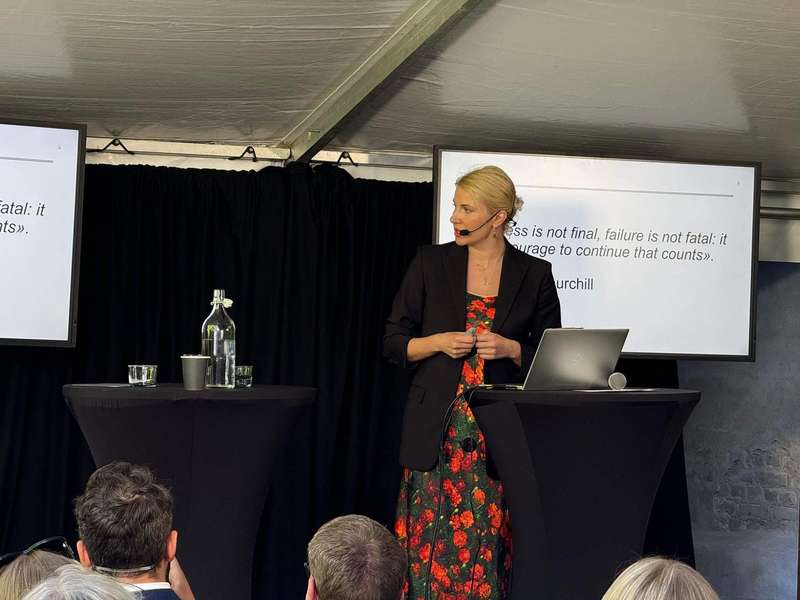You all remember how two years ago, when Russia launched a full-scale war against Ukraine, Ukrainians surprised the whole world by getting united to defend it. We have seen a unique national uprising, with queues to military conscription centers. No one wanted then, and does not want now, to be under Russia. Because to be under Russia is to be tortured, raped, deprived of our language, identity, history, and culture. To be under Russia is to be killed.
The challenge of maintaining resilience
Today, looking back on two years, I understand that such cohesion, willingness to fight, and resilience are not a given. They cannot be preserved and maintained for a long time naturally without effort.
We feel this especially acutely now when people are tired, when the queues to conscription points disappear, and what seemed easy to achieve in 2022 now seems very far away. Resilience requires special efforts when the population is under constant long-term stress, under the influence of enemy information campaigns, and under ongoing daily physical threats. When every citizen of ours lost someone in the war – either killed, lost, wounded, or displaced.
Four factors of Ukraine’s resistance
Resistance depends on the morale of society and, in particular, the army. And morale depends on four main factors:
- Training
- Leadership
- Weapons and ammunition
- Military-civil liaison and mature communication
Let’s look at each of them:
1. Training
According to surveys of Ukrainian civilians, one of the main reasons they are afraid to join the army is the lack of proper training. This goes almost equally with another reason—fear of getting an unprofessional, indifferent commander. At the beginning of the full-scale invasion, most of the soldiers came from civilian life, untrained and unprepared for combat. They had only great motivation and desire to protect the country.
Also, civilians who join the army are managed by a professional military. Unfortunately, the training of our professional military has not changed significantly since gaining independence. As a result, civilians paid for their indifference to the professional army and its training with their own blood.
Therefore, it is very important to prepare the army’s backbone very well, especially commanders of all ranks, from squad commanders to the commander-in-chief.
2. Leadership
In addition to general military training, we need to nurture and train leaders. This is a very multifaceted and complex factor.
In 1956, the American psychologist Benjamin Bloom developed a hierarchy of cognitive skills. It has six levels. Knowledge is on the first, simplest level. The last two are the most advanced ones—synthesis and evaluation. So, every military leader has to be able to evaluate and plan.
We still see the influence of the Soviet military culture, which was essentially very autocratic, obedient, and humiliating.
Another thing that hinders the education of modern leaders is the culture within our Armed Forces.
We still see the influence of the Soviet military culture, which was essentially very autocratic, obedient, and humiliating.
If you watch modern Russian films about the military, you will certainly think you are watching a gangster world. This comes from the Soviet Union, where the whole society was criminalized, and the criminal spirit was introduced to the military institutions. And since the army is a very closed institution, it has survived in this state till now in Russia.
And we do our best to squeeze the manifestations of this culture out of us, although it is constantly fighting to stay. We see how modern Ukrainian culture in the army fights against the Soviets. It’s like oil and water; they don’t mix.
Therefore, it is extremely important for us that our partners help us implement the best Western practices in the education of military leaders so that respect, creativity, and critical thinking become core parts of it. Young Ukrainian commanders are insistently demanding this.
In 2014, Ukraine changed its military doctrine and identified Russia as the main threat. However, the combat manuals did not undergo significant changes. Mostly these are Soviet manuals translated into Ukrainian. All of them, since the times of the USSR, are designed for the use of a large number of people.
However, this is something that Ukraine cannot afford. We have to protect people. Our human resources are limited, unlike Russia’s.
Ukraine cannot afford to fight with Soviet methods. We have to protect people. Our human resources are limited, unlike Russia’s.
3. Weapons and ammunition
It is difficult to fight without weapons; this is impossible in modern conditions. Especially if your enemy is the biggest country in the world with a developed military industry.
Since the beginning of the full-scale war, we have lost many capable men and women because we did not have enough weapons. Weapons must be modern and technological in order to destroy a lot and efficiently. And there shouldn’t be a deficit of it. Unfortunately, we have to cover entire defense areas with people, but we could cover them with technologies.
Apart from the USA, there is not a single country that can provide enough weapons for itself, considering how Russia takes weapons from Iran, North Korea, and China.
Fighting spirit is influenced by the ability to destroy the enemy, but without weapons, it’s impossible.

4. Military-civilian liaison and mature communication
In our country, the war is managed by the President de jure. However, de facto, it is managed by generals. Generals make mistakes, in particular, in the consumption of resources (human and material) and the strategy of waging war.
Therefore, it is also important to train politicians and civil society in military affairs. The military must be accountable; they must be controlled.
Morale is key in the struggle. Without it, even with plenty of weapons, it is impossible to win.
Both society and the army must clearly understand the threat and our goals in the war. Our goal must be communicated to everyone. Every soldier in the trench must understand what he is fighting for.
Morale is key in the struggle. Without it, even with plenty of weapons, it is impossible to win. Communication should be honest. It should not distort reality or give too positive a picture of reality if the situation on the battlefield is different.
All these four components contribute to adaptability, hope, and the will to fight. Without them, winning becomes impossible because the main battle is not physical but psychological.
When Russia attacked us two years ago, the first ones who fought were professional military. But then, very soon, the majority of them were wounded or killed, so eventually, they were replaced by civilians.
So, to sum up, I would like to say something that I wish all Ukrainians had known before the war: in peacetime, society should be fully involved and interested in the armed forces, doing everything to ensure that they are prepared. After all, when war comes, it is the civilians who become the Army; it is they who take up arms and go to fight.
Editor’s note. The opinions expressed in our Opinion section belong to their authors. Euromaidan Press’ editorial team may or may not share them.
Submit an opinion to Euromaidan Press
Related:
- Syrskyi in, Zaluzhnyi out. What our army sources expect from Ukraine’s army reshuffle
- How ordinary Russians were turned into murderers and rapists through TV and smartphones


